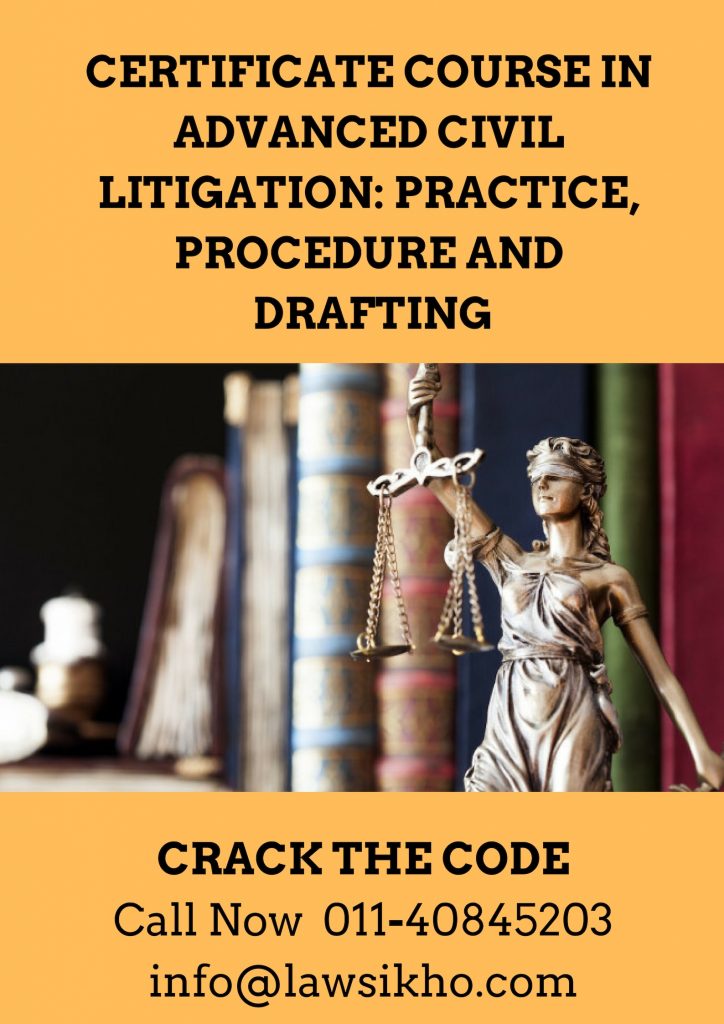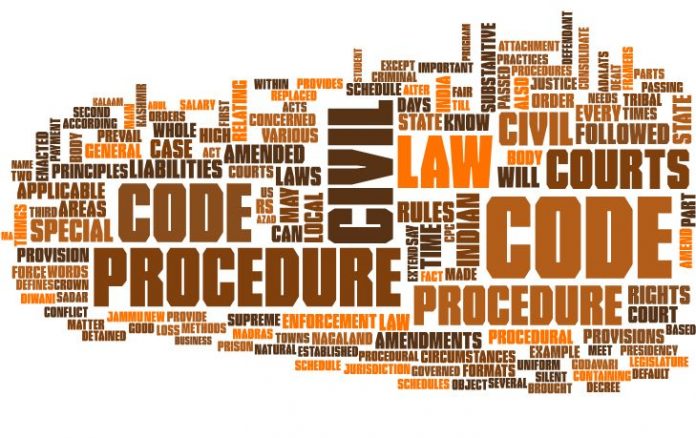The article is written by Divyank Rana, pursuing a Certificate Course in Advanced Civil Litigation: Practice, Procedure and Drafting from LawSikho.com. Here he discusses “All you need to know about Suit in which one or all of the Defendants have died”.
“Justice isn’t about fixing the past; it’s about healing the past’s future.”
― Jackson Burnett
Table of Contents
Introduction
Death is an inevitable truth of human life. The basic goal of any civil legal system is to regulate human life and deal with any dispute regarding the rights and liabilities arising between individuals, but what happens when the dispute involves the dead? Here, a legal system faces the challenge of bridging the gap between living and the dead. It has to contemplate a methodology that ensures conservation of the rights of the living when the said rights emanate from the already deceased. All this needs to be done while taking into account the great limitation that death poses in our quest for achieving absolute justice.
It is a settled law that no suit can be filed against a person already deceased, but what happens when a defendant in a civil suit dies during the pendency of a suit? The Code of Civil Procedure 1908 covers this issue U/O XXII.
Firstly, it is important to understand that not all civil suits survive after the death of a defendant, we first need to segregate the type of suits that may survive after the demise of a defendant. The court only entertains civil suits where the right to sue survives even after the demise of a defendant. There are instances where there might be multiple defendants but due to the death of a single defendant all defendants lose their right to sue in such cases the court may abet the civil suit in question.
Cases where cause of action of the suit was personal in nature the right to sue does not survive and the case cannot continue further, the said rule is in consonance with the legal maxim “actio personalis moritur cum persona” which means a personal action dies with the person. For e.g. A files suit against B for personal performance and B dies during the pendency of the suit then the said suit cannot continue further and the same shall qualify for abetment.
Abetment of a Suit
The abetment of a suit is defined in the Black’s Law Dictionary as follows:
“The determination, cessation or suspension of all proceedings in a suit, from the want of proper parties capable of proceeding therein, as upon the death of one of the parties pending the suit.”
Now, in a situation where there was only one defendant and the right to sue survives even after his death or where there were multiple defendants in a civil suit but the right to sue was only with the deceased defendant, a party to the suit may file an application U/O XXII Rule 4 of the Code of Civil Procedure within a period of 90 days to bring the legal representatives of the deceased defendant on record. Such legal representatives will be considered as defendants in the ongoing civil suit after filing of the aforementioned application. Upon careful perusal of rule 4 a point to be noted is that even the plaintiff of the suit can file an application for bringing on record the legal representative of the deceased defendant.
Right to sue Paramount
The right to sue survives as long as the cause of action persists. As per several judgements of the Hon’ble Supreme Court, a civil suit shall not be abated as long as the right to sue survives.
Non-filing of Application U/O XXII Rule 4
Where within the time limited by law no application is made U/O XXII Rule 4 sub-rule (1), the suit shall abate as against the deceased defendant as the legal proceedings cannot continue any further due to the absence of a necessary party.
Setting aside of Abetment
In case a defendant with the right to sue dies and the respective civil suit is abated by the court while the plaintiff had no knowledge of the same and thereby, failed to file an application U/O 22 Rule 4 within the prescribed limitation period i.e. 90 days as per Article 120 of the Limitation Act, 1963. The plaintiff can file an application U/S 5 of the Limitation Act, 1963 wherein the plaintiff should explain why such a lapse occurred and prove that the default was bone fide in nature. The court if satisfied may allow the plaintiff to bring the legal representatives of the deceased defendant on record at a later date.
However, if the deceased defendant had not filed a written statement or had not appeared in court after filing of the said written statement, the plaintiff would be exempted from filing an application U/O XXII Rule 4. In such a case the decree would be pronounced against the deceased defendant and the decree shall be enforced in the same way had the defendant been alive.
It is important to note that the court has the authority to determine the legal representative of the deceased party to a suit under U/O XXII Rule 5. In case such a question is presented to the appellate court, the appellate court may direct the subordinate court to conduct an inquiry in the said matter or direct the subordinate court to submit all the facts and findings it has on the record and use that to find an answer to the question.

Procedure where there is no Legal representative
As per Order XXII Rule 4A If the court is apprised that the deceased defendant has no legal representatives the court has 2 options:
- The court upon an application made by any other party, may proceed with the civil suit in the absence of any person representing the deceased defendant and use the estate of the deceased person to fulfil any pending liability found against the said defendant after the final decree in the civil suit.
- The court may by way of order appoint the Administrator General, or an officer of the court or any other person the court deems fit to represent the deceased defendant and his estate.
The court before making such a decision requires to take the following into account:
- The court may require the notice of such an application to the person having interest in the estate of the deceased defendant.
- The court needs to ascertain if the person proposed to be appointed as the legal representative is willing to represent the deceased defendant’s estate and has no adverse interest against the said defendant.
Duty of the Counsel
Order XXII Rule 10 A recognizes the duty of the counsel representing a deceased party to inform the court as well as the opposite side of such death and bring the legal heirs of the deceased on record. Even though the contract between the party and the counsel does not survive after the client’s death but is deemed to subsist to such an extent.
Death of a Defendant after hearing but before passing of the Final Decree
Sometimes a peculiar situation arises where the death of a party occurs after the hearing is complete but before the final decree is pronounced. Rule 6 of the Order XXII removes any ambiguity in such a situation by clearly elucidating that irrespective of the right to sue and forgoing all other rules of order XXII the civil suit shall not be abated after the conclusion of the hearing. The judgement pronounced thereafter shall have the same force and effect had it been pronounced before the death of the said party.
Landmark Judgements
DHC Deepak Verma vs Daya Nand C.R.P. 183/2018
The Hon’ble Court observed that the period of limitation of making an application for substitution of legal heirs of a deceased defendant begins to run from the date of death. The date upon which the plaintiff acquired knowledge of the death is not relevant for this purpose. The suit would abate as against the deceased defendant after the period of 90 days provided under Article 120 of the Limitation Act expires. However, even after this period has elapsed, the plaintiff can apply for setting aside the abatement of the suit. Although the period of 60 days is provided for this purpose in Article 121, any delay in making the application can be condoned if the plaintiff is able to show sufficient cause for the delay. The plaintiff’s ignorance about the death of the defendant and the non- compliance with Order XXII Rule 10A of the CPC are relevant factors which would have a bearing while considering the application for condonation of delay.
Jitendra Ballav Burdhan vs Dhirendranath Burdhan & Ors AIR 2004 Ori 148
In matters where a decree is challenged after the death of a defendant the Court has held that it is a matter entirely at the discretion of the legal representatives of a deceased party against whom a decree has been passed after his death to decide whether he will raise the question that the decree has become a nullity, or to abandon that obvious technical objection and fight the case on merit. It was further observed in the aforesaid case that the requirement of a legal representative to be brought on record as indicated above is not to fasten him the liability without giving him an opportunity of being heard. The principle is based on fair play and by statutory recognition and extension of the principles of natural justice. There may be cases where non-substitution would result in prejudice. The ultimate question is whether the party is prejudiced. If the party itself supports the action, and does not challenge it, another person cannot say that prejudice has been caused to the non-substituted party.
Conclusion
By perusal of the above, we can clearly see that Order XXII of the Code of Civil Procedure 1908 covers the issue of the death of a defendant in a comprehensive manner. The death of a defendant relieves the said defendant of all personal liabilities by abetting the civil suit, yet where the cause of action survives even after the death of a defendant, the court ensures no one is devoid of his right to contest his case in a fair trial by including the legal representatives of the deceased defendant. Even when a defendant has no legal representatives the court can still ensure the preservation of the said suit by appointing a person fit to represent the case of the deceased defendant or continue the suit without any representative and use the assets of the said defendant to fulfil any pending liability as last resort.
Students of Lawsikho courses regularly produce writing assignments and work on practical exercises as a part of their coursework and develop themselves in real-life practical skill.
LawSikho has created a telegram group for exchanging legal knowledge, referrals and various opportunities. You can click on this link and join:
 Serato DJ Crack 2025Serato DJ PRO Crack
Serato DJ Crack 2025Serato DJ PRO Crack










 Allow notifications
Allow notifications


